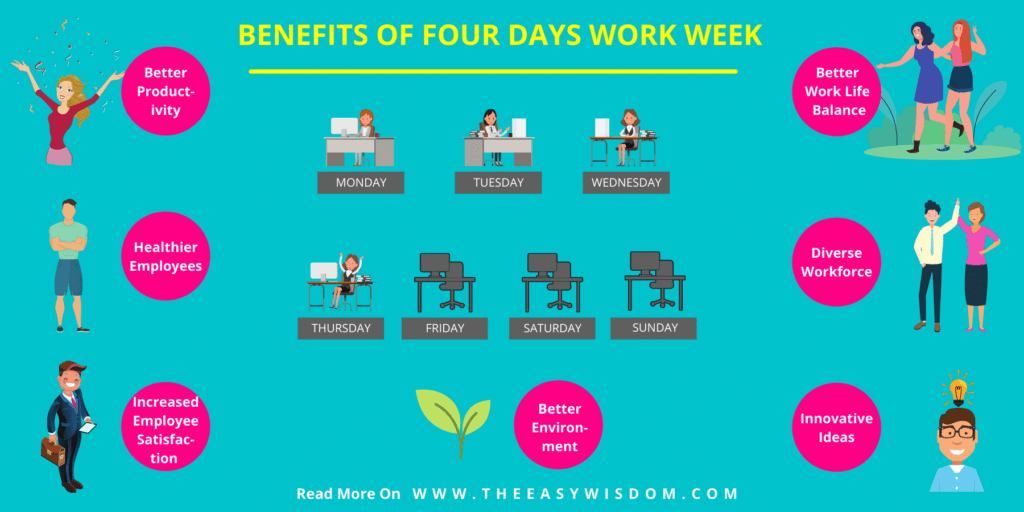We all crave a long weekend, and nothing can be more comforting than working for a company with a regular four days work week. This concept is novel, innovative and disruptive. Countries and companies across the world are already working on it. It is true that, if implemented in principle, this novel trend has the potential to make businesses productive and employees happy. It may also lead to stronger communities, a diverse workforce and create a more sustainable work environment. If the idea of four days work week is implemented along with the policy of remote work, work from home and workcations, a utopian corporate culture will soon become a reality. But is it going to be so easy? Is the corporate world ready to extend this new paradigm shift for its employees and moreover are employees ready to make the best use of it? Moreover, there are several 4-day work week pros and cons that you should know before signing up! It is just not about having a day off, it is also about being more productive, meeting the service standards, and exceeding personal, team and business goals.
Countries experimenting with the four days work week
When we talk about four days work week, the first question that pops out is about the 4-day work week countries. Spain is the recent country to implement a four day work week. This country from Europe has announced that it is working towards enhancing employee welfare by taking a step forward with a new form of work-life balance. Spain believes that adding an extra day to the weekend will boost employee productivity, morale and overall welfare of the working class. It will allow society to achieve more in a lesser amount of time.
India is also framing policies for the same, as per the recent news and a four-day work week proposal is underway. The Labour Ministry has proposed a new labour code that gives flexibility to the companies in terms of having four working days a week. The Ministry of Labour and Employment is finalizing the rules for new labour codes soon. And the companies will not require prior government approval to enact them. Surely, the government has decided to give power to the companies to choose four days work week. But we have to look at how could this move impact employee welfare, productivity and wellbeing.
However, the catch here is that the working hour limit of 48 hours for a week will remain sacrosanct. It means if your company is contemplating giving you four days work week, be ready to work almost 12 hours a day for four days to meet the weekly working hour limit of 48 hours. Will this make real sense? Or will it serve the purpose of larger employee welfare? Other countries are capping both the number of workdays and the number of work hours per week. The countries have to apply both to yield the desired result and promote true employee welfare. The real question is how will this move benefit the Indian workforce if the 48 hours per week limit is sacrosanct.
France is already fiddling with this idea of having a 32-hour workweek. The countries of New Zealand and Finland are going well with this idea. These countries are considering rolling out this plan across the country. Finland has already tried and tested various strategies over the last 20 years. This Nordic nation had passed a bill in 1996 that gave the employees an option to postpone or prepone their working hours by three hours from the standard working hours to suit their lifestyles.
In the Netherlands, the average working hour is 29 hours a week. It is the lowest in Europe. Sweden has successfully experimented with having only 6 hours workday and saw a considerable increase in productivity. As a matter of fact, it ranks as one of the best countries to work for and for its work culture.
Finland is also taking steps toward implementing a flexible six-hour day and a four days work week. The motive behind this is that they believe that people deserve to spend more time with their families, and loved ones and indulge in their hobbies and interests.
Companies experimenting with four days work week
There are several companies working on this idea. In fact, the number of 4-day work week companies is increasing day by day. Microsoft, for instance, is one such company. Microsoft experimented with four days work week concept in certain countries like Japan in 2019 only to record a 40% boost in employee productivity.
Unilever, headquartered in London, previously embarked upon a journey to test the four days work week. And they launched their pilot program with New Zealand to start with. The employees were made to work only four days and compensated for the full five days. It was decided to assess the situation after a year. And then roll it out in a phased manner across its 1,50,000 workforce spread globally.
The original idea
This concept was originally conceived and floated by the British economist John Maynard Keynes almost 100 years ago. He predicted in 1930 how the world would look in terms of employee productivity by 2030. And Keynes was right about the employee productivity that grew by 2.5 times in the US of A compared to 1930. He also proposed the idea that due to this rising productivity, people will work only three hours a day and five hours a week. His predictions were a bit ahead of his time but not wrong!
Benefits of four days work week
For most of us, overwork leads to higher stress, anxiety and a significantly lower quality of life. We often miss social gatherings, family outings, and sports events. We end up checking our business emails more often than not, coordinating with the team, thereby further alienating ourselves from friends and family. Overwork can take a toll on our relationships and well-being.
Unfortunately, sitting at the office desk for a longer period doesn’t mean that employees are working more. After a point, people get exhausted and get distracted. One way is to take shorter breaks in between the work hours to counter this distraction. Other ways are reducing the number of work hours and shortening the workweek.
Also Read: When Work from Home is No Longer a Perk – Mental Health Challenges of Working From Home
There are several 4-day work week pros and cons. While it may lead to some disadvantages if not dealt with properly, the advantages may outnumber the cons in the longer run. Here are a few potential advantages that four days work week may lead to:
1. Better Productivity
Better productivity because when employees have relatively less time at their disposal, they are less likely to waste it on non-trivial tasks. They may also cut down unnecessary time wasted on reading online newspapers, online shopping, or checking social media feeds.
2. Healthier Employees
Better Employee Heath as more free time translates to less stress and more happiness. It will lead to a healthier workforce and will create a win-win situation for all.
3. Increase in Employee Engagement
Increase in employee satisfaction, engagement, and a decrease in employee absenteeism.
4. Better Work-Life Balance
Better work-life balance and reduced stress levels as the people can engage more freely with their hobbies, interests, and families.
5. Diverse Workforce
A more diverse workforce as families may find it easier to have a shared familial responsibility. It is possible as it enables both the partners to be present at the office at different shifts and times rather than the woman partner always mostly taking a career break.
6. Innovative Thinking
More innovations at the workplace as an extra rest per week may refresh the employees and help them come up with new productive hacks. It may also foster more out-of-the-box thinking and lead to disruptive approaches.
7. Environmental Benefits
Environmental benefits as people will save on one more day commuting, and polluting the atmosphere with their cars once normal life after the pandemic is resumed.
Ultimately it all depends on how empathetic the employers are in creating a fair workplace with expectations of productivity and reasonable targets. If employees are still working overnight, over shifts, on weekends to achieve their targets and complete assignments, it hardly matters if they have four days a work week or five. Eventually, it should be all about productivity and not about office hours! While India is still adamant on 48 hours a workweek regardless of the number of workdays per week, whether four days work week will yield desired results or not, only the time will tell!
Disadvantages of four days work week
While there are many benefits of a four days work week there are a few potential disadvantages as well. Implementing such a concept will require companies to make people work on rotational shifts to ensure a seamless flow of services and handling of complaints. It may, therefore, may not be viable or cost-effective in many cases. This concept may well be suited for companies in the knowledge and technology space, but how about essential services, BPOs, or banks?
Customer satisfaction may also go down with offices standing barren from Friday to Sunday. Customers may, for instance, not be able to access services or raise a complaint. The use of technology and AI-powered customer support may solve this problem to some level, provided companies have people working on shifts and on a rotational basis.
Many may also confuse four days work week as a compressed working hour. With an upper capping of 35-48 hours per week across countries, employees will still have to work to maintain mandatory work hours. In India, four days a work week with a mandatory 48 hours per week, employees may have to work 12 hours a day. It may have a reverse effect as well and may lead to exhaustion and elevated stress levels.
Also, before cutting back on the number of workdays, the managers and the employer mindsets must evolve, or such policies may stay true only in the name. If the companies will embrace such a move swiftly, or not only time will tell. But as India is pivoting from traditional sectors to much evolved knowledge-based sectors, R&D, and IT, flexibility will be inevitable! It is no news that Millennials and Gen Z place a lot of importance on work-life balance, work satisfaction and flexibility to work. And therefore, four days work week may well be welcomed by India Inc to attract and retain talent.
Recommendations for implementing four days work week for maximum impact
- Harness a culture of productivity and let employees take their time to come up with their own measure of productivity. Let them think about how can they deliver performance and bring innovative thinking to the table.
- Roll out a pilot project by engaging professional consultants, change managers, and consulting academicians and measure the success both quantitatively and qualitatively.
- You can also consider introducing opt-in policies for employees whose presence in the organization for more than 4 days are not critical. You can then measure their productivity and lay down a road map for the future.
- Establish clear cut individual, team and company goals and objectives.
- Develop empathy and put employees first. Put your faith and trust in your employees. They will surely give back!

Recommended Read: Ghosted by Recruiter? Deal with Professional Ghosting & Attain Closure!









